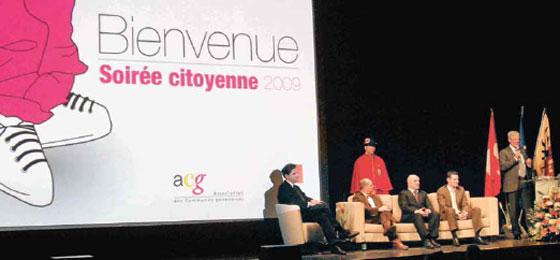Politics can wait

In Switzerland, becoming a citizen is cause for celebration. Yet the festivities don’t seem to be drawing young people towards political life. By Dominique Hartmann
A team of three researchers at the Haute Ecole de travail social of the HES-SO is looking into the impact of events organised to mark the accession to the right to vote and eligibility on later political commitment. Their study focuses on young people from middle or upper social classes, as these two categories represent the majority at public civic ceremonies.
All celebrations “try to appeal to the emotions”, says Laurence Ossipow. One even resembled an initiation ceremony with its nocturnal trail game that included a scramble up the Marly-Fribourg bridge. The main feature, however, is variety. In Asnières (Geneva), the approach is educational: the young person is accompanied by a political mentor to file a first motion at the local council. In Guin (Fribourg), there is a speech by the chair of the local authority. Games are also held, pitting elected representatives against young people. And while European, Swiss and Geneva flags fly above the city of Calvin, in Marly (Fribourg), interest leans towards regional emblems.
At these ceremonies, “it is the State under the spotlight, not young people”, says Ossipow. “It’s as if politics wants to make its mark on the minds of the young”. But another category of politician defends a very conventional vision of citizenship, mainly based on civic participation. Dissenting causes are little valued, despite being paradoxically adopted as models. And there’s another paradox linked to the order to vote. Some politicians highlight that it is not yet time to ‘take command’. Others guide the youth in the direction of social or community engagement, which is an indispensable move in areas popular with foreigners, given that they have no political (or partial) rights and therefore remain minors from a civic point of view.
Records for Geneva show that, between 1924 and 1944, ceremonies related to the obligation to serve were intended only for young men. In 1942, however, the Centre de Liaison des Associations Féminines spoke up, saying that as young girls carried out complementary social work they too must attend such events. Yet until 1960 – when women won the right to the communal and cantonal votes – separate discourses existed, one calling young men to public affairs, the other calling girls to the education of children.
Fewer and fewer
With time, political stakes have had their influence on these calls to citizenship. Between 1942 and 1944, there was the idea of strengthening patriotism. Then with the economic boom of the 1960s, the issue of a united Europe crept into the speeches. Later still, there was more controversy.
Another of the researchers, Isabelle Csupor, takes up the story. “In 1971 a young woman gave a very critical speech aimed at economic imperialism and the Church’s intolerance of contraception”. But young people had already started ignoring these kinds of events. It’s worth noting that since 2011 Geneva has begun efforts to encourage early school leavers to join the public sphere.
Concluding their study, the researchers esteem that such ceremonies “miss the point”. Even if Swiss politicians are ready to help young people to engage socially or politically, the youth are not really interested in voting. When questioned about this, they argue that they are committed, but in an essentially social way (youth clubs, responsibilities in the running of sports clubs, etc.). Politics will come later (maybe).
Dominique Hartmann is an editor atLe Courrier.
(From "Horizons" No. 102, September 2014)